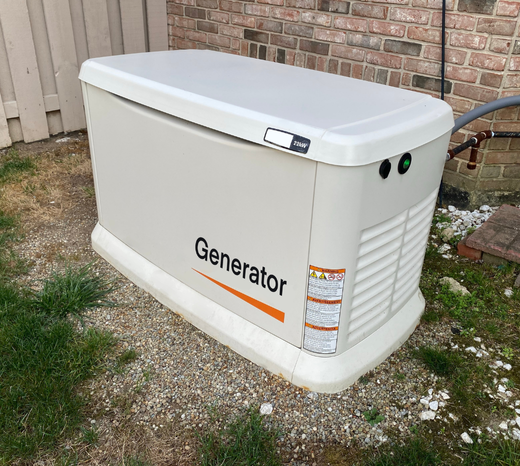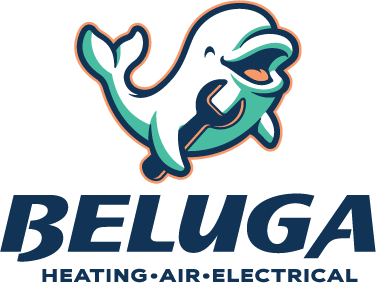Considering generator installation? You’ve come to the right place! In today’s blog, the electrical experts at Beluga Heating, Air & Electrical will go over everything you need to know about generator installation. Including the importance of proper sizing and placement, a couple things that can sometimes be overlooked.
…

There’s no better way to ensure your peace of mind this year than whole-home generator installation.
Whole-home generators help keep essential appliances and systems running in the event of a power outage. Keeping your home safe and functional. But when it comes to generator installation, it can seem overwhelming.
There are a number of generators on the market today, and how are you supposed to know which one will work for your unique needs? Well you’ve come to the right place!
In today’s blog, the electrical experts at Beluga Heating, Air & Electrical will go over everything you need to know about generator installation. Including the importance of proper sizing and placement, a couple things that can sometimes be overlooked.
At Beluga, we’re committed to providing you with quality electrical solutions. Let’s dive into the world of generators and see what we can do for you!
Why Size Matters
Just like your furnace or air conditioner, proper generator sizing is the key to reliability and longevity. That’s why each whole-home generator installation undertaken by our team starts with a thorough evaluation.
Ensuring your generator can cover your power needs is important to avoid overloading which can lead to generator damage and damage to everything connected to it. Proper sizing also ensures that your generator is running as efficiently as possible, which helps keep your costs down.
We make note of the size of your home, as well as the number of appliances, electrical and HVAC systems that are currently connected to the power supply. We’ll also find the starting power needed to kickstart each. This will help us determine the total wattage needed to cover your home. We will then provide you with unique equipment recommendations that have the appropriate capacity.
Proper generator sizing is also key to ensuring you’re paying for exactly what you need! And ensures any running costs don’t balloon out of control, down the line.
How To Assess Your Power Requirements
The first thing to consider is your heating and cooling needs during extreme weather conditions. For example, in our area, summer temperatures can regularly hit 90 degrees Fahrenheit, meaning a lot of our air conditioners are putting in overtime shifts. It’s important to take extra run time into account when planning for your generator.
Other household items and systems to take note of include:
- Refrigerators and freezers
- Sump pumps
- Lighting systems
- TVs, electronics
- Plug-in and hardwired appliances – mainly dryers
- Recreational items like hot tubs.
The Wattage Formula
We briefly touched on this above, but in order to get the right sized generator, determine the sum of the running wattage for all your household devices and add the starting wattage of the appliance with the highest starting power.
Once you have your total wattage, find a generator with a capacity that exceeds the total wattage by at least 10%. We recommend 20%.
Other Installation Factors
Wattage, while most important, is only part of the whole-home generator installation equation. Here are some other things our installation team considers when recommending generator options:
- Fuel type
- Duration of power outages in the Putnam County area
- Expansion possibilities
- Installation location for ease of access
- Adherence to local building and electrical codes
This is why professional installation is so important! There’s a lot to factor in.
The Beluga Generator Installation Process
At Beluga Heating, Air & Electrical we have a huge inventory of generators in stock, and once you’ve approved the cost and timeline estimate, we can get straight to work!
Your electrician will always complete your installation as efficiently and professionally as possible, with little to no impact on your day to day routines. In order to properly install your new generator, your electrician will have to connect it to your home’s electrical system using an automatic transfer switch. The connection time can vary job to job, but once again we’ll make sure you’re fully briefed about the scope of work before anything is started.
Finally, we believe in leaving no trace behind, except for a well-functioning generator. Our team will clean up the workspace and provide you with essential maintenance tips, like regular inspections, to extend the lifespan of your equipment. Your electrician will also walk you through warranty information.
We hope these tips have been helpful in helping you begin your generator journey. Ensure you don’t overpay or undersize, and call Beluga today! We’re standing by with fully-stocked trucks ready to complete your installation right away!
Why Choose Beluga
As a locally owned and operated business we’re committed to providing you with quality electrical work that ensures the safety and functionality of your home or business. Whether you need a generator installation or a complete rewiring project, our team of licensed, experienced electricians can handle it all. If you’re in the Putnam or Dutchess County areas, give us a call!
Common Questions About Generators
What is a whole-home generator?
A whole-home generator is a backup power system designed to automatically supply electricity to your entire home during a power outage. It is typically fueled by natural gas or propane and helps keep essential appliances and systems running in the event of a power outage.
How long does it take to install a generator?
The time it takes to install your new generator is dependent on the type of equipment you choose and the complexity of the installation itself, but we always begin every install with a comprehensive evaluation so you can be better prepared for your appointment.
Are generators noisy?
Old ones can be, for sure. But many newer models are built to run quieter with insulated enclosures, and quieter, more efficient engines.
Can I install a generator myself?
No, we do not recommend installing a generator on your own. Generator installation requires extensive electrical knowledge, and professional service ensures safety and electrical code compliance. DIY installation, repairs and tune-ups can also void your warranty, so it’s best to leave everything to the professionals at Beluga.
